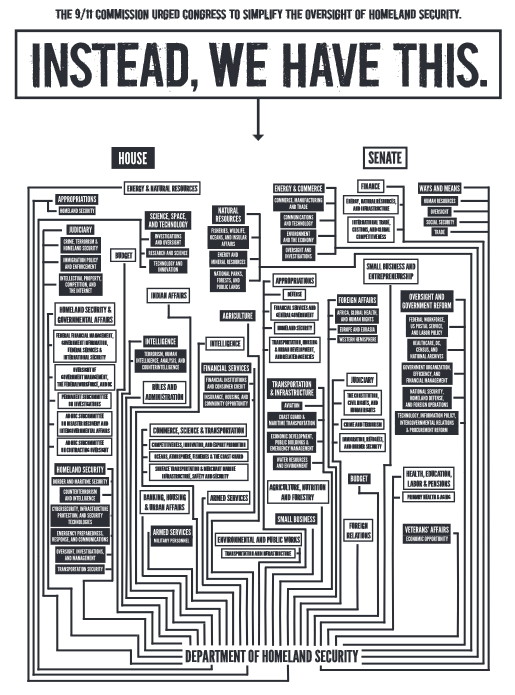A pending Senate bill to reauthorize the Department of Homeland Security is likely to include steps to streamline congressional oversight of the department, a critical measure recommended by the Sunnylands-Aspen Institute task force of security experts, which was organized with the Annenberg Public Policy Center (APPC).
The Senate bill, the first-ever reauthorization for the 16-year-old Department of Homeland Security (DHS), is likely to call for creation of a commission to examine and simplify congressional oversight of the department, according to the website nextgov.com, which reports on government and technology. The functioning of the department, created after the 9/11 terrorist attacks with the consolidation of 22 departments and agencies, has been hampered by redundant and overlapping oversight from scores of congressional committees, subcommittees, caucuses, and groups, according to many homeland security experts. In the 112th Congress, DHS answered to 92 congressional committees and subcommittees and 27 additional caucuses and groups.

Streamlining oversight of Homeland Security, the third largest cabinet department after Defense and Veterans Affairs, was one of 41 recommendations made by the bipartisan 9/11 Commission.
In 2013, a task force assembled by the Annenberg Foundation Trust at Sunnylands and the Aspen Institute Justice and Society Program, in partnership with APPC, renewed the call for Congress to streamline and consolidate oversight of DHS. The Sunnylands-Aspen task force, including 9/11 Commission co-chairs Thomas H. Kean and Lee H. Hamilton, issued its report on September 11, 2013, urging Congress to pass a first-ever reauthorization for the department and to streamline oversight.
The task force was convened by APPC director Kathleen Hall Jamieson, who is also the program director at Sunnylands, and Meryl Justin Chertoff, executive director of the Aspen Institute’s Justice and Society Program.
The Senate bill, which has not been publicly released, is a rewrite of the reauthorization bill approved last year by the House of Representatives. The House bill did not include provisions for streamlining oversight. But Senate Homeland Security Committee Chairman Ron Johnson (R., Wisc.) said streamlining oversight would be important in the Senate version, according to nextgov.com, which also quoted Sen. Heidi Heitkamp (D., N.D.) as saying, “Fractured congressional oversight means no oversight in my opinion.”
National security experts working with the Sunnylands-Aspen task force and APPC have taken a number of steps to raise awareness of the issue. Among them:
- Kean and Hamilton wrote in the New York Times op-ed “Homeland Confusion” that unless Congress addresses this issue, “our country is still not as safe as it could and should be.”
- Former Sen. Gary Hart and former undersecretary of the Army Norm Augustine wrote about the issue in the Los Angeles Times op-ed “Why 9/11 Can Happen Again.”
- More than 60 national security experts, including three past Secretaries of Homeland Security, the 9/11 Commission, and former heads of the FBI, CIA, NSA, and the Joint Chiefs, signed on to a full-page ad in the Wall Street Journal supporting oversight reform.
- An ad in the New York Times included a graphic representation of the oversight problem (also see chart above left).
- The 20-minute documentary “Homeland Confusion,” which examines the issue, was screened on Capitol Hill in 2014 before former and current government officials and Congressional staff. (View it here.)
- The screening marked the 13th anniversary of the Hart-Rudman Commission’s final report, which warned in early 2001 — before 9/11 — that the nation was at risk of an attack on American citizens on American soil, and that better congressional oversight of homeland security was needed. A 2014 report, “Alarms Unheeded,” by the Aspen Institute Justice and Society Program and the Annenberg Public Policy Center, said that the Hart-Rudman Commission’s warning was one in a series of alarms that went ignored by policymakers, the press, and the public.
- In 2014, former members of the 9/11 Commission, working with APPC and the Bipartisan Policy Center, issued “Reflections on the Tenth Anniversary of The 9/11 Commission Report,” in which they warned of emerging threats – and again voiced concern over Congress’s failure to streamline security oversight.
- In late 2014 and again in 2016, before the reorganization of a new Congress, a bipartisan group of former Homeland Security Secretaries urged Congress to streamline and consolidate oversight, calling it “a matter of critical importance to national security on which there is broad bipartisan agreement.” In a 2016 letter, former DHS Secretaries Tom Ridge, Michael Chertoff and Janet Napolitano said the consolidation of the department “remains the only major recommendation of the 9/11 Commission that ten years later has not been acted upon.”

